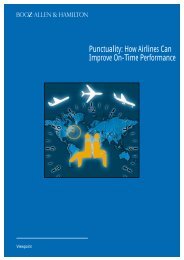The sentence
The sentence
The sentence
You also want an ePaper? Increase the reach of your titles
YUMPU automatically turns print PDFs into web optimized ePapers that Google loves.
If we say I’ll work on this tomorrow we may be stating an intention.<br />
If we say I’ll be working on this tomorrow, we are simply referring to future time.<br />
3. We use the future progressive like the present progressive for planned actions:<br />
We’ll be spending the winter in Australia is the same as:<br />
We’re spending the winter in Australia.<br />
<strong>The</strong> future perfect simple and the future perfect progressive tenses<br />
1. We often use the future perfect simple with by and not … till/until to show that an<br />
action will already be completed by a certain time in the future.<br />
We use if wit verbs which point to completion, like complete, finish and retire:<br />
I will have retired by the year 2020. I won’t have retired till the year 2020.<br />
2. We often use the future perfect progressive with verbs like learn, lie, live, rain, sit,<br />
wait and work which naturally suggest continuity to say that what is in progress now will<br />
be in progress in the future:<br />
By this time next week, I will have been working on this book for a year.<br />
I. ‘Going to’ and other ways of expressing the future<br />
Uses of the ‘going to’ –future compared with ‘will’<br />
<strong>The</strong>re are three basic uses of the ‘going to’ –future:<br />
1. Predictions: We often use going to to predict the future, especially when we can see<br />
something that is about to happen: Look out! She’s going to faint. (Not *will*)<br />
Or we can describe something which we know will take place in the future:<br />
Angus and Margaret are going to be married in May<br />
2. Intentions: We often use going to rather than will in informal style:<br />
I’m going to practice the piano for two hours this evening.<br />
I’m going to be successful one day.<br />
3. Planned actions: We use going to like the present progressive or future progressive:<br />
We’re going to spend the winter in Australia.<br />
Or: We’re spending the winter in Australia.<br />
Or: We’ll be spending the winter in Australia.<br />
4. We use will when we decide to do something at the moment of speaking:<br />
We’re lost. I’ll stop and ask the way. (= I’ve just decided to do this.)<br />
‘am/is/are to’, ‘be about to’, ‘be due to’<br />
1. We use to be to for:<br />
- formal arrangements/duties: OPEC representatives are to meet in Geneva in May.<br />
- formal appointments/instructions: <strong>The</strong>re tablets are to be taken twice a day.<br />
- prohibitions: You’re not to tell him anything about our plans.<br />
2. to be about to refers to the immediate future:<br />
Look! <strong>The</strong> race is just about to start.<br />
3. We often use to be due to to refer to timetables:<br />
<strong>The</strong> plane is due to land at 2.15.<br />
60




